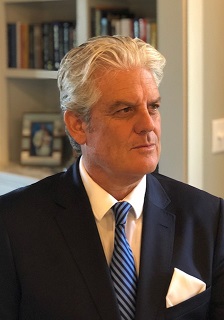From the CEO – October 2019

Dear Clients,
One of the benefits of being active in the geopolitical risk field for the better part of 25 years is that it gives one the advantage of hindsight as well as a way of conceptualizing the interdisciplinary nature of the enterprise. To be sure, the operation of political risk encompasses many fields of study, from finance to political science, from psychology to economics. But thinking about political risk can also bring in fields of study that one would not normally assume can inform.
Here’s an example: this month we noted in our INVESTIR newsletter that October was a relatively subdued month for political risk, despite the large number of changes to the risk ratings of many countries (ICRG inputted new data on poverty and joblessness in many emerging markets). We noted that there was a bottoming out of economic risk numbers throughout much of Europe; that the crisis in Chile spurred reforms and a rate cut by the central bank; that Carrie Lam would likely be removed by Beijing from Hong Kong’s top post by next year but the move would do little to temper the protests; and that pension reform should finally come to fruition, boosting the real against the majors. As such, market moves via political risk would be largely episodic, confined to the country in question, as opposed to moving the entire emerging market asset class.
It crossed my mind then, that thinking about political risk and how it evolves over time was in some ways similar to the geological process, which is characterized by waves that reflect continuous changes in the parameters through which the ‘history’ unfolds. Such undulations can be identified as a way of recognizing episodic and longer-term events linked to these changes.
So if the events of the month are the episodic waves (incidents), then some of the longer-term changes in the history of political risk can be suggested.
In a new book that I am currently co-authoring with Peter Marber, titled: Quid Periculum? Measuring and Managing Political Risk in the Age of Technology, one of the items we look at are the changes that have occurred in political risk over the years and as a way of preparing for the challenges of the present and future.
As an example, we noted in a larger discussion that overall political risks have increased markedly since 2000. A number of reasons have been put forth, including migrations from developing to advanced countries that have created a tenuous backdrop for domestic socioeconomic stability and likely contributed to the rise in populism we have seen throughout parts of Europe and arguably in the US.
Also, socio-political disturbances in advanced countries have risen given that the social contract between society and governments appears to be unraveling. The weakening of institutions’ credibility creates conditions for a crisis of social mediations, which erodes the power and trust of traditional channels for expressing frustrations and social demands, such as political parties, unions, and social organizations.
These are but a few of the items we discuss in the book, and they serve to underscore the analogy of geological history. There are many ways of looking at political risk!
In any event, turning to the ICRG ratings for the month, a number of country events stand out. As I mentioned earlier, issues of inequality led to a spike in protests, leaving scores dead. Our metrics on Civil Disorder signaled the coming unrest in mid-summer.
In Angola, political stability appears to be solid for the time being as no election is on the horizon and the opposition remains weak. However, investors have expressed concerns about FX shortages, accumulating debt arrears, and high inflation.
South Africa is in a slightly more tenuous situation, as its risk profile is complicated by the upcoming Zuma trial, high unemployment, an increase in xenophobic assaults and a possible loss in investment grade rating.
In Papua New Guinea, Contract Viability risk has risen; and a high debt burden needs to be aligned with the FRA and payments to creditors. Watch for China to play a key financing role in the country going forward.
In Sudan, even if the power-sharing arrangement proves to be viable, a permanent cessation of armed conflict could remain elusive. Food and fuel shortages and sanctions preclude support from the IMF and World Bank.
Finally, bottoming risk indicators throughout much of Western Europe has been noted in our country models/profiles, with France and Spain being some notable bright spots.
Looking at our trading models, we are slightly bullish longer term on the euro and select European equities, the Brazilian real, and the Hungarian forint. We’re are cautious on the Turkish lira and the USD very short-term as the easing cycle by the Fed has evidently now ended for the time being.
We would like to welcome some new clients this month, including UNICEF and Acadian Asset Management, as well the University of Leeds, Marmara University, Prince Sultan University and Fairsquare Research Group. We would also like to welcome back to the PRS family the Millennium Challenge Corporation, Citigroup, Wellington Management Corporation, and Japan’s Bank for International Cooperation. Thank you so much for your (longstanding) support!!
I was in Washington during the annual IMF/World Bank meetings and spent some very productive time with Philippines National Treasurer Rosalia De Leon and Deputy Central Bank Governor Francisco Dakila. We discussed the ICRG ratings we look forward to working with the Philippines over the course of the next year. I also had a very informative and jovial meeting the same day with officials from Saudi Arabia’s anti-corruption group and was impressed with the range of initiatives the Kingdom has adopted to increase transparency in business and government affairs.
PRS has unveiled its new Private Client Advantage, which offers new and existing clients a greater diversity of data offerings and regular updates, consultations, bundled products, and more. Contact us for details.
We are excited to be in the early working stages of a partnership with a longstanding Geneva/UK-based asset manager to combine our geopolitical data into an artificial intelligence application to generate unique and investible insights to global macro portfolio managers. Stay tuned for the official press release.
Finally, October was a busy month for the ICRG political risk changes as just under 80 (out of 140) countries had their profiles adjusted, affecting over 100 risk metrics.
Thanks for your continued support, and please contact us if we can be of any assistance.

Chief Executive

PRS INSIGHTS
Moving beyond current opinions, a seasoned look into the most pressing issues affecting geopolitical risk today.
EXPLORE INSIGHTS SUBSCRIBE TO INSIGHTS
